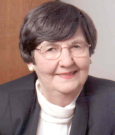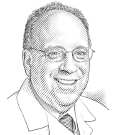“Older adults constitute the only increasing natural resource in the entire world.”
—Linda Fried, PhD,
Columbia School of Public Health
The good and bad news about our changing demographic world is that the population of older adults is increasing in the United States and worldwide. While it is good news that people are living longer and healthier, this increasing number of older people will also need health care for largely chronic diseases, especially cancer.
In 2013, the Institute of Medicine suggested that we prepare for this change,1 given the aging population, increase in cancer incidence, and the fact that of the 14 million cancer survivors in the country, 59% are over 65. These circumstances are evolving in the context of increasingly expensive and complex treatments for cancer, which will have to be delivered by a workforce that is likely to remain the same. Geriatric oncology must take the lead in planning ahead to weaken the force of the approaching “silver tsunami,” preparing oncologists and their teams, who will take the most direct hit.
Attitudes of Oncology Teams
This population will be cared for by a younger oncology team who may have had little experience with older adults since their personal experience with elders is often limited today. This problem is compounded by negative societal attitudes toward older people; young house staff may even develop derogatory terms for elders.
We are impressed by the number of older patients whose only trip outside their home over the course of a week is to their doctors’ offices. They may leave feeling cheered by a warm interaction or saddened by the negative attitudes that are evident to them, especially if they move slowly, hear poorly, or have any trouble understanding.
We must include in our “tsunami planning” the training of oncology teams in how to speak kindly and respectfully to older patients. Also, treatment decisions should be made based on level of functioning rather than chronologic age, even if it takes more time to take the history.
Demakos et al found that patients with myelodysplastic syndrome—largely an older population—are frequently not treated with the optimal number of cycles of hypomethylating agents, which contributes to poor post-treatment prognosis.2 Ageism may contribute to this early discontinuation. We can all remember when protocols routinely excluded patients over 65, before it was discovered that many older patients tolerated treatment well.
At the Communication Skills Laboratory at Memorial Sloan Kettering Cancer Center, we have developed a teaching module for oncology staff to appropriately evaluate older patients and learn how to include a family member when the patient needs assistance in decisions about treatment.
Older Patients’ Attitudes and Coping
In the 1990s, psychologists began to focus not only on psychopathology, but on the positive attributes that help us cope. An extensive review of current and past religions and philosophies found a consistent group of core character strengths that have sustained people into old age: courage, wisdom, humanity, social justice, temperance, and transcendence.3
Philosopher and ethicist Sissela Bok noted that these qualities “allow the human animal to struggle against and to triumph over what is darkest within us.”4 For example, older people speak with pride about moments of courage or sacrifices made for beloved causes, which gave their lives a sense of purpose and meaning.
Recent research by gerontologists is expanding our knowledge of the psychology of elders. While there is a decline in recall of names and a slowing of cognition, older people counter this with better emotional regulation. They react to a cancer diagnosis with less distress than younger patients, as if to say, “I’ve been through a lot—what’s one more?”
It is interesting that despite the problems of aging, reported well-being actually goes up in our early 50s and continues to rise into our 80s.5 This may be related to the “wisdom” that comes with the realization that life ahead is short, and, thus, more appreciated, making it easier to enjoy the simple pleasures, like family. There is less fear of what others think and an enhanced sense of living in the now, at the same time that it becomes important to pass on values and hard-won knowledge to the young.
There are some similarities in coping between cancer patients and older people facing old age. Both must maintain their daily lives while living with uncertainty and vulnerability about the future. Both need to identify what is most meaningful to accomplish in the time left. They do this by using the character strengths they have developed and fine-tuned over the years—with older people having had more time to hone them.
Loneliness Among Elders
Society has moved from small, close-knit multigenerational communities to big cities where it is easy to feel lonely, even (or especially) in a crowd, particularly when serious illness strikes. This situation arises for elders more today than in the past because children and family are scattered across the country. It is not uncommon for older people to describe not seeing another person for days at a time. Home health aides are a godsend to many; often, the aide begins to be perceived as a family member. We are social animals; contact with others is a critical part of life.
Counseling must be available to older patients with cancer. The telephone is a critical link when geographic closeness isn’t possible. We have developed a psychotherapy for patients that can be delivered by telephone. The contact, over five sessions, reduces feelings of loneliness, depression, and anxiety and brings a sense of meaning back to their lives [for information, contact the authors].
Another challenge is to find ways to counter boredom and depression for the elder staring at the same four walls all day. We began encouraging those who were able to join in reading literary classics for our monthly Vintage Readers Book Club (see The ASCO Post, January 15, 2013, page 83). Even those who can’t attend can join by phone or just keep up with the readings. We have had lively discussions of such classics as Cicero’s Essay on Old Age from 44 BC and The Autobiography of Ben Franklin. The discussions discourage focus on self and illness and encourage taking a fresh look at life’s universals.6
In Summary
We must prepare for the coming increase of older patients with cancer. We must understand and inoculate against negative societal attitudes by adding psychosocial issues to geriatric oncology curricula. It is important both to identify lonely elders with cancer and help set up social contact for them in any way possible.
Finding something meaningful to engage in is very useful. Phone therapy is one way to establish regular contact; encouraging interactions through reading and social exchanges is another. It is also important to note models of older people who cope well, thanks to character strengths honed over many years. ■
“Beautiful young people are accidents of nature, but beautiful old people are works of art.”
—Eleanor Roosevelt
Disclosure: Drs. Holland and Greenstein reported no potential conflicts of interest.
References
1. Levit L, Balogh E, Nass S, et al (eds): Delivering High-Quality Cancer Care: Charting a New Course for a System in Crisis. Washington, DC, National Academies Press, 2008.
2. Demakos EP, Silverman LR, Lawrence ME, et al: Incidence and treatment of myelodysplastic syndrome in the US: Treatment approaches, optimization of care and the need for additional therapeutic agents. 2014 ASH Annual Meeting. Abstract 1287. Presented December 6, 2014.
3. Peterson C, Seligman M: Character Strengths and Virtues. Oxford University Press, New York, 2004.
4. Bok S: Common Values. Columbia, Missouri, University of Missouri Press, 1995.
5. Stone AA, Schwartz JE, Broderick JE, et al: A snapshot of the age distribution of psychological well-being in the United States. Proc Natl Acad Sci USA 107:9985-9990, 2010.
6. Greenstein M, Holland J: Lighter as We Go: Virtues, Character Strengths, and Aging. New York, Oxford University Press, 2014.
Dr. Holland is Attending Psychiatrist and Wayne E. Chapman Chair at Memorial Sloan Kettering Cancer Center and Professor of Psychiatry, Weill Medical College of Cornell University in New York. Dr. Greenstein is a clinical psychologist and consultant to the geriatric group in the Department of Psychiatry at Memorial Sloan Kettering.
Guest Editor: Stuart M. Lichtman, MD, FACP, FASCO, is an Attending Physician at Memorial Sloan Kettering Cancer Center, Commack, New York, and Professor of Medicine, Weill Cornell Medical College, New York. He is also President Elect of the International Society of Geriatric Oncology (www.siog.org).




